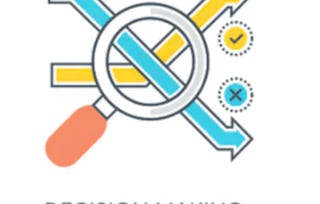Sequential Decisions builds from math and algorithms that can be understood and used by Coursera Students. This course will start from a consideration of the simplest type of data streams and then gradually advance to more complex types of data and more nuanced decisions being made on that data. You will be able to: (a) program optimal decisions for data arriving from known distribution functions, (b) define error bars and nuanced hedges about ongoing data streams to reflect missing data and/or missing knowledge, (c)understand and use the connections from these models to further understand Markov Chains and Markov Processes and how these ideas connect to Reinforcement Learning and (d) Understand better the nuances between time-independent, time-dependent, one-dimensional and multi-dimensional data.

Data Science Decisions in Time: Using Data Effectively

Data Science Decisions in Time: Using Data Effectively
This course is part of Data Science Decisions in Time Specialization

Instructor: Thomas Woolf
Included with
Recommended experience
What you'll learn
By the end of the course you will: (1) understand sequential testing and thus when to stop collecting data and (2) how this concept is used today.
Skills you'll gain
- Reinforcement Learning
- Statistical Methods
- Time Series Analysis and Forecasting
- Anomaly Detection
- Probability Distribution
- Estimation
- Bayesian Statistics
- Machine Learning Methods
- Sampling (Statistics)
- Data Science
- Markov Model
- Forecasting
- Data-Driven Decision-Making
- Statistical Analysis
- Skills section collapsed. Showing 8 of 14 skills.
Details to know

Add to your LinkedIn profile
11 assignments
See how employees at top companies are mastering in-demand skills

Build your subject-matter expertise
- Learn new concepts from industry experts
- Gain a foundational understanding of a subject or tool
- Develop job-relevant skills with hands-on projects
- Earn a shareable career certificate

There are 5 modules in this course
This module introduces the class and the approach to teaching it to be used for the next five weeks. We begin with simple sequential data, similar to Wald’s model: data arrives from a distribution and is not time dependent. This can be generative data. We then explore increasingly complex data from distributions collected for health or business reasons. We finish the week with connections to code work and to AI.
What's included
5 videos2 readings2 assignments1 discussion prompt
This module is the bridge into Markov Processes and Markov Chains. Thompson sampling is an old algorithm, that has been revived and is currently in-use on many challenging problems. By understanding this material and the connections to last week and to the week ahead, students will be well positioned to have mastered this first course in the specialization
What's included
3 videos1 reading2 assignments1 discussion prompt
Change points are locations where the previously stationary distributions of the last two modules shift to a new distribution In a manufacturing line this could be due to a new batch of materials that arrive with different characteristics, so the failure rate changes.
What's included
2 videos1 reading2 assignments1 discussion prompt
Markov chains describe a sequence of state changes. They are often used to describe complex transitions between states and are a primary modeling tool for improving understanding of a complex system. We will use them as a model for how sequential data may be produced by a more complex system.
What's included
3 videos1 reading2 assignments1 discussion prompt
The next step in modeling ability is Markov processes with decisions. This connects to modern research in reinforcement learning and enables optimization over the sets of decisions for an optimal outcome. In this last week of the first course we will cover the basics of how these Markov Decision Processes can be parameterized and what they mean.
What's included
2 videos1 reading3 assignments1 discussion prompt
Earn a career certificate
Add this credential to your LinkedIn profile, resume, or CV. Share it on social media and in your performance review.
Instructor

Offered by
Explore more from Data Analysis

Johns Hopkins University

Johns Hopkins University

Johns Hopkins University
Why people choose Coursera for their career

Felipe M.

Jennifer J.

Larry W.

Chaitanya A.

Open new doors with Coursera Plus
Unlimited access to 10,000+ world-class courses, hands-on projects, and job-ready certificate programs - all included in your subscription
Advance your career with an online degree
Earn a degree from world-class universities - 100% online
Join over 3,400 global companies that choose Coursera for Business
Upskill your employees to excel in the digital economy
Frequently asked questions
To access the course materials, assignments and to earn a Certificate, you will need to purchase the Certificate experience when you enroll in a course. You can try a Free Trial instead, or apply for Financial Aid. The course may offer 'Full Course, No Certificate' instead. This option lets you see all course materials, submit required assessments, and get a final grade. This also means that you will not be able to purchase a Certificate experience.
When you enroll in the course, you get access to all of the courses in the Specialization, and you earn a certificate when you complete the work. Your electronic Certificate will be added to your Accomplishments page - from there, you can print your Certificate or add it to your LinkedIn profile.
Yes. In select learning programs, you can apply for financial aid or a scholarship if you can’t afford the enrollment fee. If fin aid or scholarship is available for your learning program selection, you’ll find a link to apply on the description page.
More questions
Financial aid available,

